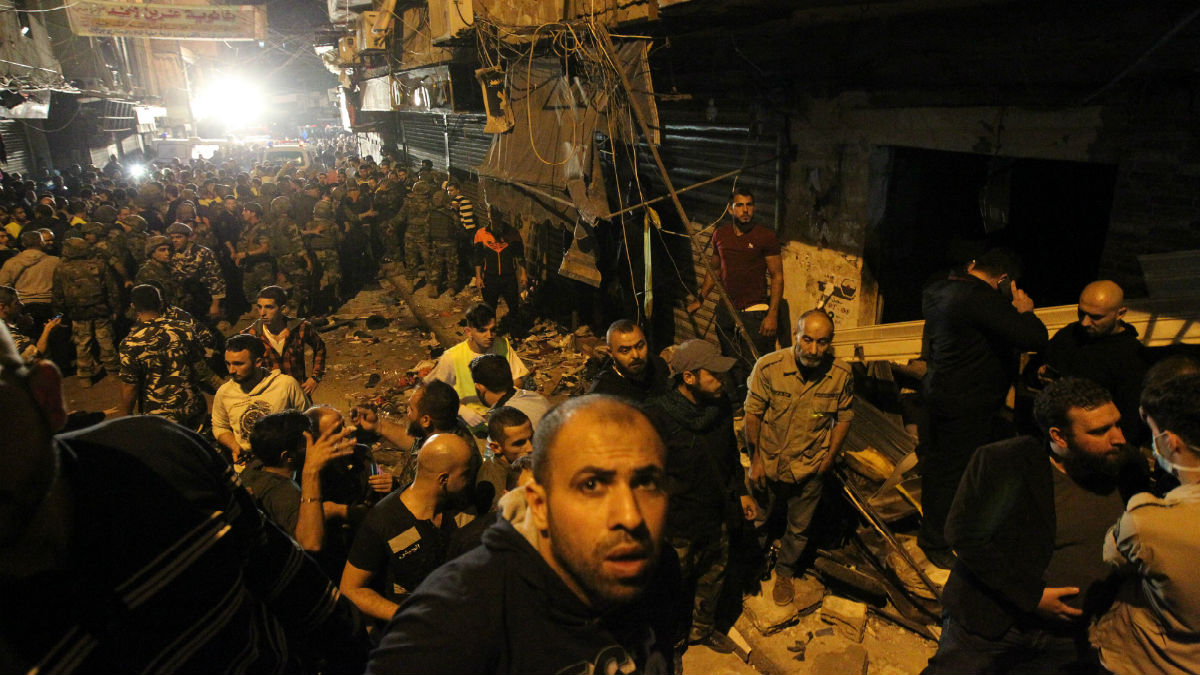Islamic State claims twin Beirut blasts that killed dozens
Two suicide bombs kill at least 43 people and injure more than 200 others in the Lebanese capital

A free daily email with the biggest news stories of the day – and the best features from TheWeek.com
You are now subscribed
Your newsletter sign-up was successful
Islamic State has claimed responsibility for two suicide bomb attacks in the Lebanese capital Beirut, which killed at least 43 people and injured more than 200.
The two detonations occurred less than 150 metres apart, and within five minutes of each other, in the residential Bourj al-Barajneh district, a stronghold of Hezbollah forces fighting IS in Syria.
The timing of the blasts is a common tactic in suicide bomb attacks, according to Lebanon's state-run National News Agency. Detonating two bombs is designed to kill people who converge on the scene of the first explosion to help the wounded.
The Week
Escape your echo chamber. Get the facts behind the news, plus analysis from multiple perspectives.

Sign up for The Week's Free Newsletters
From our morning news briefing to a weekly Good News Newsletter, get the best of The Week delivered directly to your inbox.
From our morning news briefing to a weekly Good News Newsletter, get the best of The Week delivered directly to your inbox.
Lebanese Prime Minister Tammam Salam condemned the attacks as "unjustifiable" and declared Friday a day of national mourning.
One witness described the site as a "scene of chaos and carnage" with a "lot of shattered glass on the street" and "a lot of blood".
Another described the sound: "When the second blast went off, I thought the world had ended."
The body of a third bomber, who appears to have been killed by the second blast before he could detonate his own explosives vest, was recovered from the rubble.
A free daily email with the biggest news stories of the day – and the best features from TheWeek.com
According to a Lebanese security source speaking to CNN, a fourth would-be bomber survived the attack and has been taken into custody. He apparently told investigators that he was an IS recruit and that he and three other attackers arrived in Lebanon from Syria two days before.
Hezbollah said the bombing as "a Satanic terrorist act, carried out by apostates".
The BBC says the bombing is the worst in Beirut since the end of Lebanon's civil war in 1990. The country has seen much violence in recent decades, including a car bomb in the capital last year, for which IS claimed responsibility. According to the United Nations, the civil war in neighbouring Syria has contributed to intermittent violence near the border and has also led to more than a million people seeking refuge in Lebanon.
-
 Political cartoons for February 13
Political cartoons for February 13Cartoons Friday's political cartoons include rank hypocrisy, name-dropping Trump, and EPA repeals
-
 Palantir's growing influence in the British state
Palantir's growing influence in the British stateThe Explainer Despite winning a £240m MoD contract, the tech company’s links to Peter Mandelson and the UK’s over-reliance on US tech have caused widespread concern
-
 Quiz of The Week: 7 – 13 February
Quiz of The Week: 7 – 13 FebruaryQuiz Have you been paying attention to The Week’s news?
-
 Epstein files topple law CEO, roil UK government
Epstein files topple law CEO, roil UK governmentSpeed Read Peter Mandelson, Britain’s former ambassador to the US, is caught up in the scandal
-
 Iran and US prepare to meet after skirmishes
Iran and US prepare to meet after skirmishesSpeed Read The incident comes amid heightened tensions in the Middle East
-
 Syria’s Kurds: abandoned by their US ally
Syria’s Kurds: abandoned by their US allyTalking Point Ahmed al-Sharaa’s lightning offensive against Syrian Kurdistan belies his promise to respect the country’s ethnic minorities
-
 Israel retrieves final hostage’s body from Gaza
Israel retrieves final hostage’s body from GazaSpeed Read The 24-year-old police officer was killed during the initial Hamas attack
-
 China’s Xi targets top general in growing purge
China’s Xi targets top general in growing purgeSpeed Read Zhang Youxia is being investigated over ‘grave violations’ of the law
-
 Syria’s Islamic State problem
Syria’s Islamic State problemIn The Spotlight Fragile security in prison camps leads to escape of IS fighters
-
 Panama and Canada are negotiating over a crucial copper mine
Panama and Canada are negotiating over a crucial copper mineIn the Spotlight Panama is set to make a final decision on the mine this summer
-
 Why Greenland’s natural resources are nearly impossible to mine
Why Greenland’s natural resources are nearly impossible to mineThe Explainer The country’s natural landscape makes the task extremely difficult